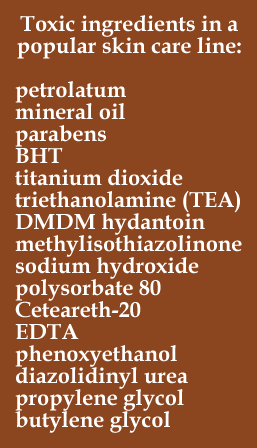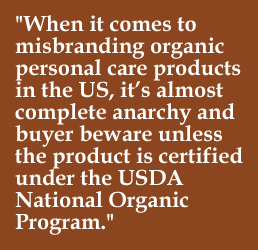The amount of information we already have on the harmful chemical ingredients of skin care products is enough to make one's head spin. Therefore, we did a cursory survey of the ingredients in a popular skin care line that does not claim to be "natural" or "organic", and it revealed the following common toxic ingredients (among many other ingredients with long chemical names):
 There was petrolatum, which is mineral oil jelly, as well as mineral oil, which are carcinogenic by-products of the distillation of gasoline from crude oil (1). We found parabens, which are known to mimic estrogen and suspected of being carcinogens (2). Another carcinogen found was the preservative BHT (3), which is also linked to allergic reactions, hyperactivity, rashes, asthma, and toxicity to the liver and kidneys. Yet other carcinogens found in this product line were titanium dioxide (4), triethanolamine (TEA) (5), and DMDM-hydantoin (a formaldehyde releaser) (6). And then there was methylisothiazolinone, which causes nerve damage (7). Sodium hydroxide, which is lye or drain cleaner, was present in this product line. Polysorbate 80 and Ceteareth-20, other chemicals found among the ingredients, are commonly contaminated with the highly toxic 1,4-dioxane (8). EDTA, a harsh detergent and hormone disruptor (9), was also present, and so was phenoxyethanol, which "can depress the central nervous system and may cause vomiting and diarrhea" (10) in infants. We also found diazolidinyl urea, a preservative that releases carcinogenic formaldehyde (11) and can cause dermatitis (12). For skin care products, it is certainly ironic to find chemicals that cause dermatitis, and there was yet another such chemical, propylene glycol, associated with irritant and allergic contact dermatits as well as contact urticaria (hives) (13). Butylene glycol was also found. These two glycols are also found in antifreeze.
There was petrolatum, which is mineral oil jelly, as well as mineral oil, which are carcinogenic by-products of the distillation of gasoline from crude oil (1). We found parabens, which are known to mimic estrogen and suspected of being carcinogens (2). Another carcinogen found was the preservative BHT (3), which is also linked to allergic reactions, hyperactivity, rashes, asthma, and toxicity to the liver and kidneys. Yet other carcinogens found in this product line were titanium dioxide (4), triethanolamine (TEA) (5), and DMDM-hydantoin (a formaldehyde releaser) (6). And then there was methylisothiazolinone, which causes nerve damage (7). Sodium hydroxide, which is lye or drain cleaner, was present in this product line. Polysorbate 80 and Ceteareth-20, other chemicals found among the ingredients, are commonly contaminated with the highly toxic 1,4-dioxane (8). EDTA, a harsh detergent and hormone disruptor (9), was also present, and so was phenoxyethanol, which "can depress the central nervous system and may cause vomiting and diarrhea" (10) in infants. We also found diazolidinyl urea, a preservative that releases carcinogenic formaldehyde (11) and can cause dermatitis (12). For skin care products, it is certainly ironic to find chemicals that cause dermatitis, and there was yet another such chemical, propylene glycol, associated with irritant and allergic contact dermatits as well as contact urticaria (hives) (13). Butylene glycol was also found. These two glycols are also found in antifreeze.
We also did a casual survey of the ingredients in some popular "natural" brands found in health food stores. There were many long chemical names. There was also undisclosed "fragrance", almost certainly synthetic, and such fragrances have been documented to be carcinogenic and toxic in other ways, causing headaches, dizziness, allergic rashes, skin discoloration, coughing, vomiting, and skin irritation as well as nervous system and behavioral effects (14). There were also chemical preservatives such as sodium benzoate and potassium sorbate. Sodium benzoate has many toxic effects on the body as outlined in its Material Safety Data Sheet (MSDS), and when combined with ascorbic acid (vitamin C), it forms benzene, a known carcinogen. Potassium sorbate is fundamentally non-toxic but can cause skin irritation per its MSDS. In any case, it seems that synthetic preservatives that inhibit the growth of micro-organisms would also generally not be beneficial to other living organisms such as humans.
In these "natural" skin care products, We also found vitamins, listed by their chemical names, and therefore probably synthetic. Some studies published in Science, The New England Journal of Medicine, and other journals suggest that some synthetic vitamins are toxic, and some extracted vitamins have been found to be useless since they need to be in a whole food form because the whole vitamin is a complex, not just the one molecule identified as the principal component.
In "natural" products we also found certain vegetable oils that could be harmful: polyunsaturated oils like safflower, sunflower, cottonseed, corn, soy, and canola. High heat is generally used in the production of these oils. Polyunsaturated oils are unstable, fragile, and susceptible to rancidity when subjected to heat, which causes the production of free radicals, associated with cell damage, aging, and disease. Certainly, we do not want to be applying products high in free radicals to our skin, causing the very types of problems we are trying to relieve or prevent. And polyunsaturates would not seem to be conducive to skin health, extrapolating from the fact that the modern excess consumption of these types of oils leads to a host of health problems. (15)
 A little more research into "natural" skin care products revealed a shocking hidden ingredient not listed on the label: 1,4-dioxane. A carcinogen that readily penetrates the skin, it is also suspected to be a kidney toxicant, neurotoxicant, and respiratory toxicant, among others. There was a press release from the Organic Consumers Association (www.organicconsumers.org) on March 14, 2008 entitled, "Carcinogenic 1,4-Dioxane Found in Leading 'Organic' Brand Personal Care Products". We believe this example could be considered the tip of a toxic iceberg, a discovery of the sort of thing that is probably happening with many of the other ingredients of skin care products.
A little more research into "natural" skin care products revealed a shocking hidden ingredient not listed on the label: 1,4-dioxane. A carcinogen that readily penetrates the skin, it is also suspected to be a kidney toxicant, neurotoxicant, and respiratory toxicant, among others. There was a press release from the Organic Consumers Association (www.organicconsumers.org) on March 14, 2008 entitled, "Carcinogenic 1,4-Dioxane Found in Leading 'Organic' Brand Personal Care Products". We believe this example could be considered the tip of a toxic iceberg, a discovery of the sort of thing that is probably happening with many of the other ingredients of skin care products.
The study commissioned by the Organic Consumers Association shows that the cancer-causing compound called 1,4-dioxane has been found in some of the most commonly used petroleum-based cosmetics including products from Kiss My Face, Nutribiotic, Jason, Ecover, Citrus Magic, 365, Alba, Lifetree, Giovanni, Seventh Generation, Method, Earth Friendly Products, Sea-Chi Organics and many other brands. The explanation for the presence of 1,4-dioxane is that "ethoxylation, a cheap short-cut companies use to provide mildness to harsh ['harsh'?!] ingredients, requires the use of the cancer-causing petrochemical ethylene oxide, which generates 1,4-dioxane as a by-product." (16) There are many labeled ingredients that imply the presence of 1,4-dioxane: "To avoid 1,4-dioxane, the OCA urges consumers to search ingredient lists for indications of ethoxylation including: 'myreth,' 'oleth,' 'laureth,' 'ceteareth,' any other 'eth,' 'PEG,' 'polyethylene,' 'polyethylene glycol,' 'polyoxyethylene,' or 'oxynol,' in ingredient names." (17)
 A poignant passage from the same press release states the following:
A poignant passage from the same press release states the following:
"A visit to any health food store unfortunately reveals that the majority of products in the personal care section with 'organic' brand claims are not USDA-certified and contain only cheap water extracts of organic herbs and maybe a few other token organic ingredients for organic veneer. The core of such products is composed of conventional synthetic cleansers and conditioning ingredients usually made in part with petrochemicals. According to market statistics, consumers are willing to pay significantly more for products branded 'natural' or 'organic' which they believe do not contain petrochemical-modified ingredients or toxic contaminants like 1,4-dioxane.... When it comes to misbranding organic personal care products in the US, it's almost complete anarchy and buyer beware unless the product is certified under the USDA National Organic Program." (18)
Keep in mind that this is just one example of the many chemical processes that produce all of those chemical names in the ingredients of your skin care products (and virtually all of your other commercial products, for that matter). It's impossible to know what toxic residues, like 1,4-dioxane, that those other chemical processes are leaving in your products that aren't on the ingredient list. And how can we be sure that the chemical ingredient that is in the ingredient list (even if it says "plant derived") isn't toxic itself, like the many examples above? This is why common sense dictates that we should avoid all products with chemical names in the ingredient list.
Read on: A Healthy and Effective Skin Care Option
References:
1. International Agency for Research on Cancer (27 March 2012). Agents Classified by the IARC Monographs, Volumes 1-104: 20.
2. Harvey PW, Everett DJ (Jan 2004). "Significance of the detection of esters of p-hydroxybenzoic acid (parabens) in human breast tumours". Journal of Applied Toxicology 24 (1): 1-4.
3. International Agency for Research on Cancer (1986). "Butylated hydroxytoluene (BHT)". IARC Monographs on the Evaluation of Carcinogenic Risks to Humans 40:161-206.
4. "Nanoparticles Used in Common Household Items Cause Genetic Damage in Mice". Science Daily 16 Nov. 2009.
5. Stott WT, Radtke BJ, Linscombe VA, Mar MH, Zeisel SH (2004). "Evaluation of the potential of triethanolamine to alter hepatic choline levels in female B6C3F1 mice". Toxicol Sci 79 (2): 242-7.
6. Epstein, MD, Samuel S. (2009). Toxic Beauty: How Cosmetics and Personal-Care Products Endanger Your Health... and What You Can Do About It. BenBella Books, Inc., Dallas: 33.
7. Shen Du, BethAnn McLaughlin, Sumon Pal, Elias Aizenman (2002). "In vitro neurotoxicity of methylisothiazolinone, a commonly used industrial and household biocide, proceeds via a zinc and extracellular signal-regulated kinase mitogen-activated protein kinase-dependent pathway". Journal of Neuroscience 22 (17): 7408-7416.
8. Epstein: 33.
9. Epstein: 34.
10. U.S. Food and Drug Administration (23 May 2008). "FDA Warns Consumers Against Using Mommy's Bliss Nipple Cream". FDA News Release.
11. Epstein: 33.
12. Lehmann, Søren Vig; Hoeck, Ulla; Breinholdt, Jens; Olsen, Carl Erik; Kreilgaard, Bo (2006). "Characterization and chemistry of imidazolidinyl urea and diazolidinyl urea". Contact Dermatitis 54 (1).
13. Epstein: 39.
14. Epstein: 93.
15. Fallon, Sally, Enig, Mary G., PhD (1 Jan. 2000). "The Oiling of America", section: "Dangers of Polyunsaturates".
16. Organic Consumers Association (14 Mar. 2008). "Carcinogenic 1,4-Dioxane Found in Leading 'Organic' Brand Personal Care Products", Press Release. (http://www.organicconsumers.org/bodycare/DioxaneRelease08.cfm)
17. Ibid.
18. Ibid.
